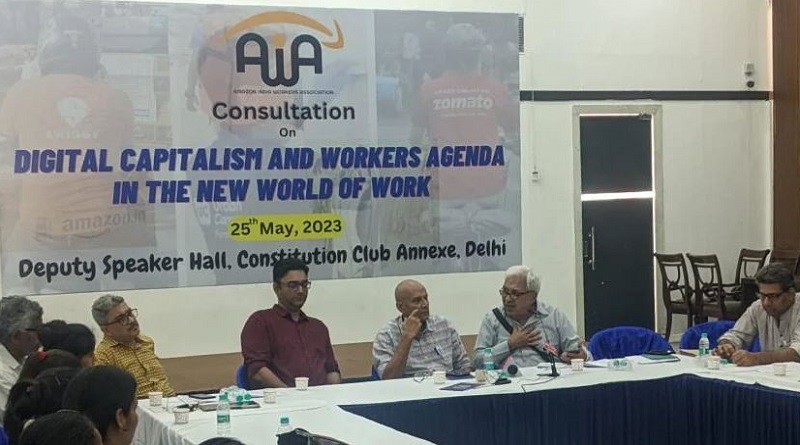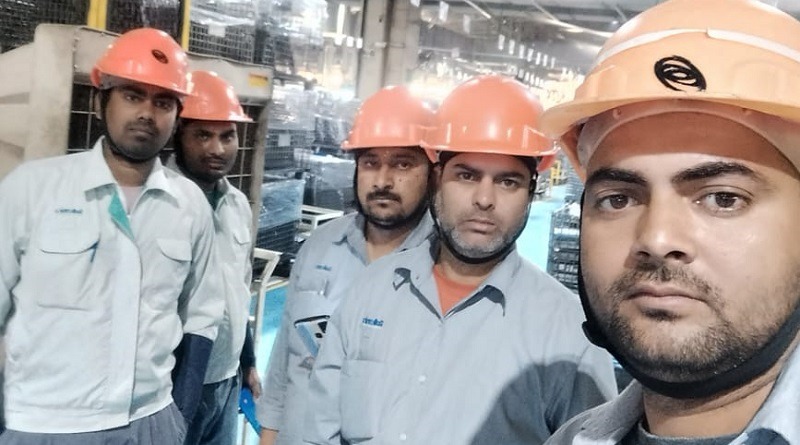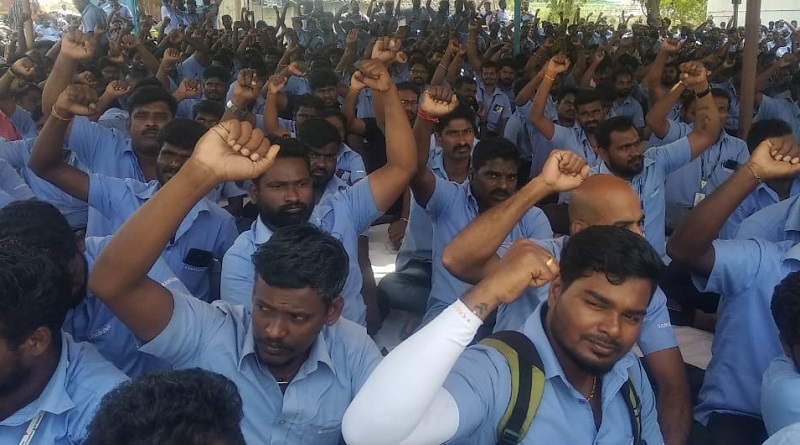Amazon Workers in the age of Digital Capitalism: Labour rights in Gig economy

On Thursday, 25th May 2023, Amazon India Workers’ Association organized a consultation on “Digital Capitalism and Workers’ Agenda in the New World of Work.” The event took place at the Constitution Club, New Delhi and was attended by diverse stakeholders including platform workers from Amazon, Zomato, Ola-Uber etc., students, researchers, workers’ organizations, NGOs, Legal experts etc.
The day-long event was kicked off by a brief introduction by Mr. Dharmendra Kumar contextualising the theme of the consultation. He emphasised that the shift from electronic surveillance such as CCTV cameras to digital and artificial intelligence backed surveillance is now governing every aspect of workers’ lives. The first session of the day was dedicated to hearing the voices of the workers present. Several men and women employed in diverse roles within the platform economy shared their experiences and the hardships that they face in their work and their lives every day.
Some Facts-
- Amazon generated over $1.29 billion in daily revenue as of 2022
- Amazon is world’s largest retailer and a prominent provider of cloud services
- Amazon focused on e-commerce, cloud computing, digital streaming, and artificial intelligence (AI) services.
- Working condition is very poor in Amazon warehouse
- Employees are compelled to perform tasks beyond their designated roles, claimed a worker
Use of Digital Technologies to Create Inhumane Working Environment
Several workers employed at the Amazon warehouses spoke about the inhumane conditions in the work sites, particularly highlighting the long working hours (often upto 10 hours at a stretch where some workers have to walk the distance equivalent of 25 kilometres), lack of adequate breaks and meal times, absence of any spaces for the workers to rest, uncomfortable temperatures within the warehouse, inadequate medical support in case of accidents or emergencies etc. For women, these conditions were particularly harsh, as they were expected to lift heavy loads alone, without any support or adequate gear. Both men and women shared that Amazon employs fewer workers at every section of their warehouse and gives them unrealistically high targets, which affects their physical and mental health.
Men and women who work with Amazon shared that the poor working conditions in the Amazon warehouses are further worsened by the imposition of a complex apparatus of digital surveillance on the workers. Using technology, the workers’ movement is continuously monitored, even during breaks or even when they visit the bathrooms. A continuous process of data collection takes place at the warehouses, and the workers are evaluated hourly for their production. When workers are unable to achieve the impossible production targets, they are reprimanded and penalised. The workers also spoke about the faulty mechanisms through which the company counts ‘idle time’ of workers, and wrongfully penalising the workers.
Pankaj, who himself works as a delivery partner, shared the challenges faced by app-based delivery employees in their work. He mentioned the loss of flexibility experienced by delivery partners, who are now forced to book fixed time slots in advance and can only work within those hours. He also explained the mechanisms of digital surveillance on delivery partners, which takes place through an intricate rating system. Often the delivery partners are penalised for no fault of theirs in situations such as when the restaurant delays orders, or if the GPS and the apps are faulty. The system does not give the delivery partners the agency to cancel any orders, even in cases of emergency. As is the case with Amazon workers, all incentives attached to good performance are designed to be out of reach.
Kanwaljeet Gill, who works with Ola-Uber drivers and other driver aggregator app workers highlighted the issue of indiscriminate ID blocking used by these companies to penalise drivers. He raised issues of exorbitant commissions and low fares to the drivers which are not commensurate to the rising fuel prices.
Challenges Faced by Women and Migrant workers in the Informal/Gig Economy
Dr. Gayatri Nair from IIIT Delhi shared the challenges faced by women gig workers, majority of whom engage in salon work. She spoke about the financial barriers faced by women to even start working, which includes significant investments towards acquiring mobile handsets, data services, and the company approved starting kits which can be as expensive as Rs. 30,000. Moreover, these women workers who could have ideally benefitted from the flexibility of working hours provided by gig work platforms, due to the rise in commissions and reduced rates eventually force women to work for upto 12 to 14 hours a day to earn a decent income. In her intervention, the issue of digitalisation was raised, which has completely eliminated support staff from the side of the company. The already vulnerable women workforce is often left at the mercy of technology-based solutions to deal with emergencies and safety issues faced by the women. She shared that women gig workers are now demanding that they want a person available on call, as opposed to an SOS button on the app, to support them through emergencies and difficult situations.
Dr. Geetisha Sengupta from APU, Bangalore, who highlighted the use of algorithms to exploit gig workers based on their gender and migrant identities. Particularly raising issues faced by migrant women workers, she shared how certain companies want to exploit the migrants for their diverse language skills, but do not want to offer them additional support to deal with the challenges that they have to face as migrants. Dr. Sengupta also highlighted the endless pressures on gig workers who have to continuously keep working towards ensuring their “employability” and “work readiness” in order to earn decent incomes, the former of these requires them to spend resources on upgrading their skills, and the latter pushes them to be constantly willing to take up work even at odd hours and in situations which make them vulnerable.
Exploring the Potential of Legal Interventions for Ensuring Workers’ Rights
At the consultation, Sangam Tripathy from IFAT spoke about their organisation’s experiences of organising app- based transport workers. He shared that their organisation has adopted a three-pronged approach where they simultaneously engage with ground level organizing of workers, policy interventions, and legal interventions. He also emphasised that gig workers can benefit from strategic instrumentalization of the Social Security Code, 2020, which also offers protection to them.
In the post-lunch sessions, several speakers from diverse Indian and international organisations joined the consultation. Nick Rudikoff from Uni Global Union joined online to share about Amazon’s surveillance practices in Europe. He said that surveillance today is no more about watching over workers using cameras etc. but instead digital surveillance takes place through the use of complex algorithms. He spoke about the various applications (Amazon A to Z, Amazon Chime, Amazon Relay etc.) used by Amazon to extract data from its workers. He also shared that Amazon is known to spy on its workers through social media platforms, and surveil workers’ unions. His presentation raised important questions regarding what can be done to legally to protect workers from this kind of intrusive and problematic surveillance. K.K. Niyogi from AIWA said that in the case of gig workers all kinds of labour laws are violated. Often workers are made to sign contracts with terms which do not allow for workers to organize or to protest against their employers.
In her presentation Barbora Cernusakova from International Lawyers Assisting Workers Network proposed that in case of weak Labour Laws and Labour Protection Policies for gig workers, the use of other kinds of laws such as Social Protection Laws, Data Protection Laws, and Human Rights Laws etc. can be used to achieve welfare and just treatment for gig workers. To substantiate her arguments, she shared case studies from Spain and Italy where such laws were used to highlight the exploitation of workers and the extortion of value, and subsequently succeeded in getting justice to the workers.
In his intervention at the consultation, Siddharth Srinivas from Clean Mobility Campaign addressed the environmental concerns pertaining to last mile delivery. He said that the onus of reducing the exorbitant amount of carbon emissions from the activities of delivery platforms should be on the companies. He also spoke about the urgent need for inclusion of workers and workers’ perspectives in any policy level consultations regarding environmental issues, which is not the case at present.
Senior Supreme Court Advocate Colin Gonsalves gave an overview of the provisions in the Industrial Disputes Act and the Factory Act to all the workers present. By discussing these provisions, he demonstrated the power of the existing legislations in India and said that they are very much in favour of the workers and their struggles. He urged the workers to make use of these laws and other favourable Supreme Court judgements to legally fight for their rights in courts. He also warned everyone against the proposed labour codes which will weaken the existing protections enshrined in the law, leaving workers across all sectors more vulnerable than ever before.
The event concluded with a vibrant debate among the various participants on the merits and challenges of various approaches, i.e. political action, policy interventions, and legal recourse, and their efficiency in addressing the issue faced by gig workers, and the ways in which they can complement each other. Moreover, the participants were urged to reflect on what can be the potential role of the digital economy and the mass of urban poor that are employed by it, in shaping the agenda for the upcoming 2024 Lok Sabha elections.
Do read also:-
- Labour in ‘Amrit Kaal’ : A reality check
- Discovering the truth about Demonetisation, edited and censored, or buried deep?
- Class Character of a Hindu Rashtra- An analysis
- Gig Workers – Everywhere, from India to America, from delivery boys to University teachers
- May Day Special: Working masses of England continue to carry the spirit of May Day through the Year
- New India as ‘Employer Dreamland’
- Urgent need for reinventing Public Sector Undertakings
Subscribe to support Workers Unity – Click Here
(Workers can follow Unity’s Facebook, Twitter and YouTube. Click here to subscribe to the Telegram channel. Download the app for easy and direct reading on mobile.)



